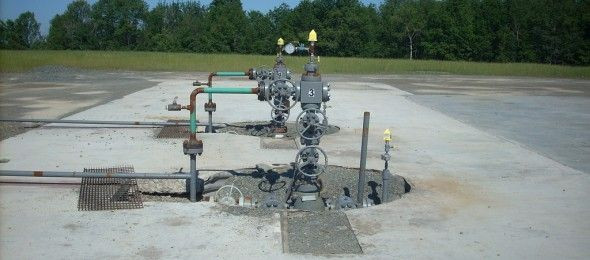George P. Mitchell, 'Father of Fracking,' Dead At 94

George P. Mitchell, the billionaire known as the "Father of Fracking," or hydraulic fracturing, died Friday at age 94.
A statement from the Cynthia and George Mitchell Foundation states that Mitchell died of natural causes surrounded by his family. His story is described as "quintessentially American." Born to Greek parents, Mitchell graduated at the top of his 1940 class at Texas A&M University in petrochemical engineering and geology. The foundation describes him as a philanthropist who cared about sustainability.
Mitchell was known for pioneering the fracking process and being the first to successfully extract shale gas, reducing energy costs for consumers and businesses and causing natural gas prices to plummet. Throughout his life, he was involved in developing 10,000 wells and 1,000 wildcat wells — oil wells drilled in areas that aren't known to be oil fields.
"The biggest difference [in the rise of shale gas] was down to the efforts of one man: George Mitchell," the Economist wrote in 2012. "Big oil and gas companies were interested in shale gas but could not make the breakthrough in fracking to get the gas to flow. Mr. Mitchell spent ten years and $6 million to crack the problem...Everyone, he said, told him he was just wasting his time and money."
In a statement, energy historian Daniel Yergin said Mitchell "changed the world energy outlook in the 21st century and set in motion the global rebalancing of oil and gas that is now occurring."
Fracking has been cause for national debate in recent years, with environmentalists decrying its potential health hazards, and the energy industry claiming that fracking poses no health risks. A fluid made of a mixture of water, sand and fracking chemicals is drilled thousands of feet into the earth to burst through the shale rock and tap into the large oil reservoirs trapped behind the rock.
Early in 2013, a group of researchers from the University of Pennsylvania, in collaboration with researchers at Columbia University and Johns Hopkins University, decided to start a project to investigate the health concerns brought up by fracking, namely headaches, breathing issues, and nausea experienced by people living near gas drilling sites or wastewater pits.
One of the major concerns is the "flowback" water that spills out from the gas wells, containing plenty of chemicals. The Environmental Protection Agency (EPA) has also been working on their own study to better understand the impact of fracking on the environment and drinking water resources.
However, the University of Pennsylvania study could take years to form any conclusive evidence about the issue.
Although George P. Mitchell may be famous globally for pioneering fracking, he is known as a philanthropist in his hometown of Galveston, Texas. He spent tens of millions of dollars to help rebuild the city, in addition to donating to Texas A&M University at Galveston. He contributed to the development of a suburban community known as the Woodlands, while preserving 27,000 acres of East Texas forest and natural resources.
Published by Medicaldaily.com



























